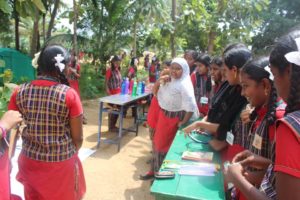How CBSE Schools Encourage Practical Learning
Education is no longer confined to textbooks and rote learning. The Central Board of Secondary Education (CBSE) has adopted a modern approach that emphasizes practical learning and skill development to prepare students for real-world challenges. By integrating hands-on experiences, technology-driven teaching methods, and project-based learning, CBSE schools are transforming the traditional learning process. In this article, we will explore how CBSE schools encourage practical learning and equip students with essential life skills.

The Shift from Rote Learning to Practical Learning
Traditionally, Indian education focused on memorization, but CBSE has introduced a student-centric approach that emphasizes understanding concepts through application. This shift ensures that students retain knowledge better and can apply it effectively in real-life situations.
Key Features of Practical Learning in CBSE Schools
- Activity-Based Learning – Encouraging students to engage in hands-on activities.
- Project Work & Research Assignments – Enabling students to explore concepts beyond textbooks.
- Use of Technology – Smart classrooms, online simulations, and digital tools enhance learning.
- Skill-Based Assessments – Evaluating students on application and critical thinking rather than rote memorization.
- Field Trips & Industry Exposure – Connecting theoretical learning with real-world experiences.
1. Activity-Based Learning: Making Education Interactive
CBSE schools implement activity-based learning (ABL) strategies where students participate in practical exercises, group discussions, and hands-on experiments. This method enhances concept clarity and problem-solving skills.
Examples of Activity-Based Learning
- Science: Performing lab experiments to understand physics and chemistry concepts.
- Mathematics: Using real-life scenarios for better comprehension, like applying geometry in architecture.
- Languages: Role-playing and storytelling to improve communication skills.
- Social Studies: Conducting debates and model parliament sessions to develop analytical thinking.
2. Project Work & Research Assignments: Encouraging Critical Thinking
CBSE mandates project-based learning where students create models, conduct surveys, and prepare case studies. This approach enhances research skills, teamwork, and creativity.
Examples of Project-Based Learning
- Science & Environment: Preparing a project on renewable energy sources.
- Mathematics: Statistical analysis of local demographic data.
- Business Studies & Economics: Market research on a small business or startup.
- History & Political Science: Documentary on historical events or government policies.
3. Use of Technology: Digital Learning & Smart Classrooms
Technology integration in education has made learning more engaging and accessible. CBSE schools use smart classrooms, AI-driven learning apps, and online assessments to improve understanding.
Technological Tools Used in CBSE Schools
- Virtual Labs: Online science experiments for better understanding.
- Augmented Reality (AR) & Virtual Reality (VR): Immersive learning experiences for complex subjects.
- Learning Management Systems (LMS): Platforms like Google Classroom and Moodle for digital education.
- Coding & Robotics: Introduction to programming and robotics at an early stage.
4. Skill-Based Assessments: Moving Beyond Marks
CBSE has introduced a competency-based education (CBE) system where students are assessed on skills rather than just marks. This approach ensures holistic development and prepares students for higher education and careers.
Skill-Based Assessments in CBSE Schools
- Case Study Analysis: Encouraging students to analyze real-world problems.
- Problem-Solving Questions: Testing logical thinking instead of memorization.
- Oral Presentations & Viva: Improving communication and confidence.
- Practical Assessments: Laboratory work and field surveys for hands-on experience.
5. Field Trips & Industry Exposure: Bridging the Gap Between Theory & Practice
Field trips, industrial visits, and expert interactions help students connect classroom knowledge with real-world applications. This practical exposure prepares them for future careers.
Examples of Field Trips & Industry Exposure
- Science & Environment: Visiting research laboratories or nature reserves.
- Commerce & Economics: Exploring stock markets, banks, and industries.
- Engineering & Technology: Visiting manufacturing units and tech firms.
- Media & Journalism: Exposure to newsrooms and media houses.
Skill Development Initiatives in CBSE Schools
Apart from academics, CBSE focuses on vocational training and life skills to prepare students for employment and entrepreneurship.
1. Vocational Training Programs
CBSE offers vocational courses in:
- Information Technology & Coding
- Healthcare & Paramedics
- Tourism & Hospitality
- Automotive & Engineering Skills
- Financial Literacy & Business Management
2. Life Skills & Personality Development
CBSE schools integrate life skills education into their curriculum, helping students build confidence and adaptability.
- Leadership Training: Student council, debate clubs, and public speaking.
- Entrepreneurship Programs: Encouraging students to develop business ideas.
- Mental Health Awareness: Stress management workshops and counseling sessions.
- Communication Skills Development: Emphasis on verbal and written communication.
Conclusion
CBSE schools are revolutionizing education by promoting practical learning and skill development through activity-based learning, project work, technology integration, and real-world exposure. This modern approach ensures that students not only excel academically but also develop critical thinking, problem-solving, and employability skills.
By embracing hands-on education and experiential learning, CBSE schools are shaping future-ready individuals who can confidently face challenges in their careers and personal lives.
With continuous advancements in education methodologies, CBSE remains committed to providing holistic and skill-oriented learning experiences for students across India.
